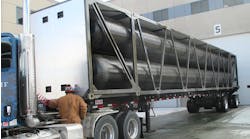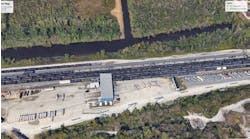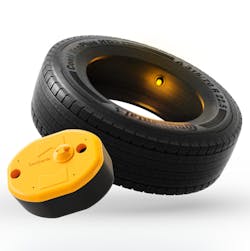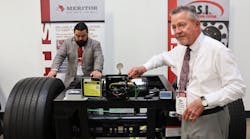Heniff acquires New Orleans tank wash
US Energy to expand in Wisconsin
Wabash acquires TrailerHawk.ai
API launches DEF resource page
UVALDE, Texas—Continental’s expansive Uvalde Proving Grounds, where the global tire manufacturer, other suppliers, and fleets test passenger and commercial vehicles and equipment on 26 diverse courses, isn’t for the faint of heart. The conditions are severe, from the various wet and off-road courses to the unforgiving summer temperatures—which hit a heat index of 115 degrees F on this June afternoon—and the critters are eager to devour those who don’t take hydration to heart—and end up fainting to the floor.
“They say everything in Texas wants to kill you,” warned Ricky Ruiz, a Proving Grounds employee who escorted guests on the off-road handling course.
“That’s kind of true. So just be mindful. Look down.”
Fortunately, for fleets, dealers, and media who took part in the first ContiXperience in the scorching Texas Hill Country heat west of San Antonio, Conti tires kept everyone safely on track across five “Xperiences” highlighting Continental’s 5,000-acre North American research and development center, “intelligent-ready” Generation 5 truck tires coming later this year, and innovative new ContiConnect digital solutions and Gen 2 sensors.
Continental executives also used the interactive event, which featured three new Peterbilt trucks, to detail their “Vision 2030” plan to increase the company’s share of the North American truck tire and retread markets by providing commercial vehicle fleets with flexible, fully integrated, earth-friendly solutions.
“We’re moving toward [becoming] a complete solutions provider that can monitor your tires, [with] a 360-degree service that sits around … the tire process,” said Shaun Uys, Conti vice president of sales and marketing for the U.S. truck tires market.
Eye on the future
Uys, now based in Continental’s Fort Mills, South Carolina, headquarters, is helping spearhead the company’s commercial plans here after spending much of his 23-year Conti career in various roles within his native South Africa. Sustainability is a key focus, so Conti is investing in renewable materials, and material sourcing capabilities, and commercial tire retreads, an area where Uys admits Continental has “room to grow.”
A technology center expansion coming to Fort Mills will support that growth, Uys asserted.
See also: Yokohama targets application-specific design
“Our tire group sector has put together a strategy for Vision 2030, and what sits in the center of our company’s vision is our customers, and driving our customers’ visions going forward,” he told the crowd during a kickoff presentation. “And it’s supported by our opportunity, our team, our responsibility, and our core—and definitely a solutions provider for fleets is something that’s well-embedded into our strategy.”
But to provide a 360-degree tire solution for today’s fleet owners, the 152-year-old company must embrace “digitalization,” argued Carolina Wagner, head of marketing and digital solutions. “Doing what we did for the past 150 years is not going to guarantee the future, so we need to adapt,” she said. That’s why Continental also is investing heavily in new tire technologies, including traceable compounds, wireless radio frequency identification (RFID) systems—debuting with Conti’s Gen 5 tires—and a Bluetooth-enabled app still under development that reads tread depths and recognizes wear patterns. “We’re adding more and more technology that is not necessarily related to the rubber or design of the tire, but is now making the tire talk to us, and the truck, and other devices more often, enabling us to provide better services,” Wagner said.
Continental already is well situated to execute their holistic vision, she contended.
The company manufactures more than just tires, also producing everything from powertrain components, and chassis and body parts—like fluid hose lines, air springs, cameras, and radars—to cabin and interior pieces, and tire monitoring devices. So more than 1 billion people already use Conti products worldwide, and 75% of all vehicles globally have at least one Continental part, according to the company. That equates to roughly 200 million vehicles in the U.S. alone. And ContiConnect Live cloud-based truck and trailer monitoring, which launched in March, already has 200 fleet users and 30,000 connected tires, Wagner reported.
“We’re not an average tire company,” she maintained. “We are part of one of the biggest automotive groups in the world, and by being so, we can claim we are the tire company that best knows about vehicles overall, because we actually manufacture many pieces … [and] deal with data transmission, so we go way beyond the tire itself, and then we apply a lot of technology back and forth, exchanging ideas among the groups.”
Digital tire monitoring
Continental first introduced the ContiConnect Yard platform in 2019 to help domiciled fleets that frequently return to a central location increase uptime and efficiency. Vehicles with ContiConnect tire sensors only need to be in the proximity of the yard station reader for approximately 2 minutes to collect data, including tire pressure, tire temperature, and sensor information, and then transmit it to the IoT platform.
Bulk haulerVenezia Transport, one of the earliest adopters, reports increasing trailer tire life from 24 to 36 months using the platform.
“Venezia operates 750 tractors and 1,500 trailers that utilize a ContiConnect Yard Reader,” Bob DeAngelo, director of maintenance at Venezia, said in a news release. “The ContiConnect Yard Reader gives Venezia the ability to quickly show our customers that we have implemented a solution to ensure on-time deliveries.”
Now fleets have two options for collecting data, the Yard Reader and new Live option, which utilizes brand-agnostic sensors and vehicle-mounted hardware to transmit information to the ContiConnect web portal in real time. Live is better suited for long-haul trucks and trailers, but mixed fleets can use both platforms in tandem. And new Gen 2 sensors, now available pre-installed or in the aftermarket, offer increased functionality, including Bluetooth connectivity, mileage counting, battery-life estimation, and over-the-air updates.
See also: P.S.I. touts automatic tire inflation system
Gen II sensors last a minimum of four years or 400,000 miles, and cost $40 if purchased separately, Wagner said. Live solution hardware costs about $500 per truck, paid up front or in payments. The monthly subscription ranges from $10 to $40 per truck, depending on protections, compared to $350 per yard for the Yard Reader. But Wagner insists both tire monitoring investments pay for themselves within the first month. And a recent Technology & Maintenance Council tire and wheel study indicates properly inflated tires benefit from 15% longer tread life and 20% longer casing life—which extends retreadability—and provide a 1% increase in fuel efficiency, saving fleets $600-$800 per vehicle annually.
Combined with fewer roadside breakdowns and CSA violations, and lower insurance premiums, Continental estimates fleets can save up to $4,000 per vehicle annually. “The goal with digital tire monitoring is to identify issues with tires before they become a major problem,” Trey Thompson, field engineering manager at Continental, said during Xperience 2. “If the proper actions are taken, the outcome is optimal tire management, longer tire life, and lower overall costs—and the fleet is going to operate more efficiently.”
Continental also is rolling out a Live stand-alone trailer solution this fall. The battery-powered system enables real-time, 24/7 monitoring of unhooked trailers for up to a month on a single charge, with GPS location, mileage estimation, tire pressure and temperature data included, helping fleets pinpoint trailer locations, identify any issues with trailer tires before they leave the yard—and even track stolen or missing tires.
Next-gen technology
Continental’s Gen 5 truck tires, including the Conti HSR5 regional all-position tire and HDR5 regional drive tire, hit the North American market in Q4. The HSR5, developed for Class 4 and 5 trucks, features new tread compounds that deliver improved rolling resistance and durability, Continental said. The HDR5 incorporates 3D matrix siping for improved traction and tire wear. Both are available in tire size 225/70R19.5 with 16/32-in. tread depth.
The sensor-ready tires also boast Three Peak Mountain Snow Flake (3PMSF) certification and retreadability; and some Gen 5 tires will have RFID capabilities, enabling fleets to identify the make and model, serial number, unique identification number, and size.
“Our Continental Generation 5 tires set a new bar in performance for our customers,” Uys said in a release. “When a tire is enabled with Continental digital technology such as a Gen II sensor and RFID tag, the tire becomes an object for life with complete tracking for maintenance, retreading, and transparency for fleet managers.
“In fact, Ford has selected the Conti HSR5 and HDR5 tires in the 19.5-inch size as the OE fitments for its new 2023 Ford F450 and F550.”













